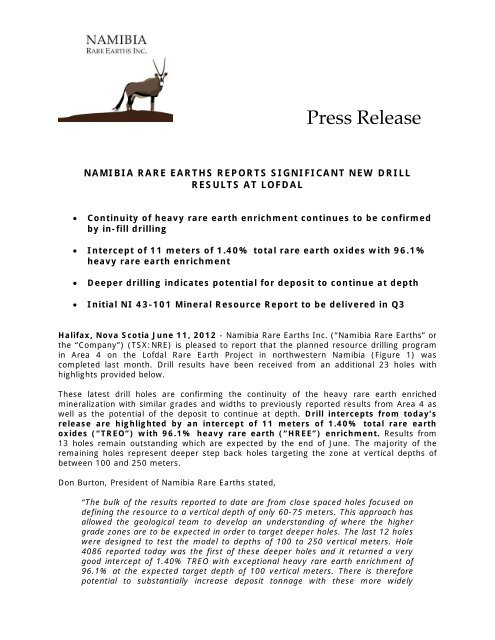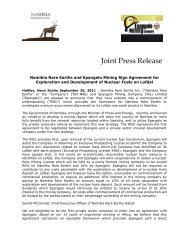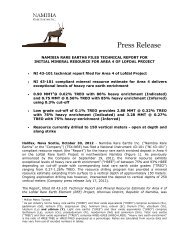Namibia Rare Earths Reports Significant New Drill Results at Lofdal
Namibia Rare Earths Reports Significant New Drill Results at Lofdal
Namibia Rare Earths Reports Significant New Drill Results at Lofdal
Create successful ePaper yourself
Turn your PDF publications into a flip-book with our unique Google optimized e-Paper software.
Press Release<br />
NAMIBIA RARE EARTHS REPORTS SIGNIFICANT NEW DRILL<br />
RESULTS AT LOFDAL<br />
<br />
Continuity of heavy rare earth enrichment continues to be confirmed<br />
by in-fill drilling<br />
Intercept of 11 meters of 1.40% total rare earth oxides with 96.1%<br />
heavy rare earth enrichment<br />
<br />
<br />
Deeper drilling indic<strong>at</strong>es potential for deposit to continue <strong>at</strong> depth<br />
Initial NI 43-101 Mineral Resource Report to be delivered in Q3<br />
Halifax, Nova Scotia June 11, 2012 - <strong>Namibia</strong> <strong>Rare</strong> <strong>Earths</strong> Inc. (“<strong>Namibia</strong> <strong>Rare</strong> <strong>Earths</strong>” or<br />
the “Company”) (TSX:NRE) is pleased to report th<strong>at</strong> the planned resource drilling program<br />
in Area 4 on the <strong>Lofdal</strong> <strong>Rare</strong> Earth Project in northwestern <strong>Namibia</strong> (Figure 1) was<br />
completed last month. <strong>Drill</strong> results have been received from an additional 23 holes with<br />
highlights provided below.<br />
These l<strong>at</strong>est drill holes are confirming the continuity of the heavy rare earth enriched<br />
mineraliz<strong>at</strong>ion with similar grades and widths to previously reported results from Area 4 as<br />
well as the potential of the deposit to continue <strong>at</strong> depth. <strong>Drill</strong> intercepts from today’s<br />
release are highlighted by an intercept of 11 meters of 1.40% total rare earth<br />
oxides (“TREO”) with 96.1% heavy rare earth (“HREE”) enrichment. <strong>Results</strong> from<br />
13 holes remain outstanding which are expected by the end of June. The majority of the<br />
remaining holes represent deeper step back holes targeting the zone <strong>at</strong> vertical depths of<br />
between 100 and 250 meters.<br />
Don Burton, President of <strong>Namibia</strong> <strong>Rare</strong> <strong>Earths</strong> st<strong>at</strong>ed,<br />
“The bulk of the results reported to d<strong>at</strong>e are from close spaced holes focused on<br />
defining the resource to a vertical depth of only 60-75 meters. This approach has<br />
allowed the geological team to develop an understanding of where the higher<br />
grade zones are to be expected in order to target deeper holes. The last 12 holes<br />
were designed to test the model to depths of 100 to 250 vertical meters. Hole<br />
4086 reported today was the first of these deeper holes and it returned a very<br />
good intercept of 1.40% TREO with exceptional heavy rare earth enrichment of<br />
96.1% <strong>at</strong> the expected target depth of 100 vertical meters. There is therefore<br />
potential to substantially increase deposit tonnage with these more widely
2<br />
spaced and deeper holes and confirm the potential of the deposit to continue <strong>at</strong><br />
depth.”<br />
<strong>New</strong> <strong>Drill</strong> <strong>Results</strong><br />
<strong>New</strong> results are highlighted by:<br />
<br />
<br />
<br />
<br />
<br />
<br />
<br />
1.40% TREO over 11.00 meters with 96.1% HREE enrichment<br />
(including 2.08% TREO over 7.00 meters with 97.3% HREE enrichment)<br />
0.56% TREO over 10.00 meters with 73.6% HREE enrichment<br />
(including 1.83% TREO over 2.00 meters with 86.5% HREE enrichment)<br />
0.43% TREO over 20.00 meters with 82.3% HREE enrichment<br />
(including 1.14% TREO over 2.00 meters with 95.2% HREE enrichment)<br />
0.40% TREO over 10.00 meters with 88.0% HREE enrichment<br />
(including 1.81% TREO over 1.00 meter with 97.4% HREE enrichment)<br />
0.31% TREO over 15.00 meters with 71.4% HREE enrichment<br />
(including 1.12% TREO over 1.00 meter with 93.8% HREE enrichment)<br />
0.27% TREO over 30.00 meters with 82.6% HREE enrichment<br />
(including 0.96% TREO over 2.00 meters with 89.6% HREE enrichment)<br />
0.25% TREO over 35.00 meters with 79.1% HREE enrichment<br />
(including 2.49% TREO over 1.00 meter with 95.5% HREE enrichment)<br />
Intercept widths are reported as down the hole widths and are not necessarily true widths.<br />
Interpreted dips of the mineralized zones vary from 45 to 80 degrees and all holes were<br />
drilled <strong>at</strong> -55 degrees. A complete listing of all analytical results is provided in Table 1.<br />
The total meters drilled for the initial Area 4 resource estim<strong>at</strong>e is 9,520 meters of NQ<br />
diamond core with an addition 310 meters of HQ diamond core available for metallurgical<br />
test work. Surface sampling of 13 trenches comprising 870 meters was also completed and<br />
will be incorpor<strong>at</strong>ed into the Area 4 resource model. The resource program remains on<br />
schedule for delivery of the initial NI 43-101 compliant mineral resource report in the third<br />
quarter of 2012.<br />
Resource <strong>Drill</strong>ing Program<br />
The mineral resource drilling program is being carried out on the Area 4 heavy rare earth<br />
enriched 1 target where the 2011 explor<strong>at</strong>ion drilling program had deline<strong>at</strong>ed significant rare<br />
earth mineraliz<strong>at</strong>ion over a 650 meter strike length. The 6,000 meter drilling program has<br />
focused on the first 60-75 vertical meters of the zone with selected step back holes to 100-<br />
150 vertical meters. A single hole was completed targeting the deposit <strong>at</strong> a vertical depth of<br />
250 meters. <strong>Drill</strong>ing services are being provided by JGM <strong>Drill</strong>ing and Explor<strong>at</strong>ion of <strong>Namibia</strong>.<br />
Down-hole geophysical surveys for rock density measurements have been completed on 48<br />
drill holes to d<strong>at</strong>e by Gregory Symons Geophysics of <strong>Namibia</strong>.<br />
These drill results and those previously released from Area 4 (Company press releases<br />
August 3, September 15, December 5, 2011 and March 30, 2012) have demonstr<strong>at</strong>ed th<strong>at</strong><br />
1 As per industry norms heavy rare earths (“HREE”) and their oxide equivalents (“HREO”) comprise europium (Eu),<br />
gadolinium (Gd), terbium (Tb), dysprosium (Dy), holmium (Ho), erbium (Er), thulium (Tm), ytterbium (Yb),<br />
lutetium (Lu) and yttrium (Y). Light rare earths (“LREE”) and their oxide equivalents (“LREO”) comprise<br />
lanthanum (La), cerium (Ce), praseodymium (Pr), neodymium (Nd) and samarium (Sm). Total rare earths<br />
(“TREE”) and their oxide equivalent (“TREO”) comprise HREE+LREE (HREO+LREO). “Heavy rare earth enrichment”<br />
is the r<strong>at</strong>io of HREE:TREE or HREO:TREO expressed as a percentage. R<strong>at</strong>ios are calcul<strong>at</strong>ed from source d<strong>at</strong>a and<br />
may vary from use of rounded numbers in tables.
3<br />
the zone exhibits exceptional heavy rare earth enrichment of 70 to 95% over drill widths of<br />
4.0 to 35.0 meters with average grades of between 0.2 to 1.4% TREO. Within this zone<br />
there are higher grade intervals over drill widths of 0.35 to 7.0 meters with average grades<br />
of 1.0 to 6.2% TREO with up to 98% heavy rare earth enrichment.<br />
Twelve of the twenty-three holes reported today represent four in-fill sections, ten holes<br />
complete targeting to the 60 vertical meter level and one hole targeted to 100 vertical<br />
meters (Figure 2 and Table 1). Of the remaining thirteen holes pending eight were targeted<br />
to intersect <strong>at</strong> 100 vertical meters, four holes to intersect <strong>at</strong> 150 vertical meters and one<br />
hole is targeted to intersect the zone <strong>at</strong> 250 vertical meters (Figure 3). These holes were<br />
drilled <strong>at</strong> an azimuth of 345 degrees and inclined <strong>at</strong> -55 to -75 degrees.<br />
Sample prepar<strong>at</strong>ion and analytical work for the drilling program is being provided by<br />
Activ<strong>at</strong>ion Labor<strong>at</strong>ories Ltd. (Windhoek, <strong>Namibia</strong> and Ancaster, Ontario) employing ICP-MS<br />
techniques suitable for rare earth element analyses and following strict internal QAQC<br />
procedures inserting blanks, standards and duplic<strong>at</strong>es.<br />
43-101 Resource Estim<strong>at</strong>e<br />
MSA Group of South Africa has been engaged to deliver a N<strong>at</strong>ional Instrument 43-101<br />
compliant resource estim<strong>at</strong>e which is targeted to be completed in third quarter 2012.<br />
Independent Qualified Persons working with MSA on the project include H. Scott Swinden,<br />
PhD, P.Geo. of Swinden Geoscience Consultants Ltd. and Peter Siegfried, MSc, MAusIMM of<br />
GeoAfrica Prospecting Services cc who co-authored the qualifying technical report for the<br />
Company’s initial public offering in 2011. Geological services are being provided by Remote<br />
Explor<strong>at</strong>ion Services <strong>Namibia</strong> (Pty) Ltd. under the supervision of Franck Bizouerne,<br />
Explor<strong>at</strong>ion Manager for <strong>Namibia</strong> <strong>Rare</strong> <strong>Earths</strong> Inc. Mineralogical studies and support are<br />
being provided by Dr. James Clarke of Applied Petrographics (USA) and samples are being<br />
submitted to Activ<strong>at</strong>ion Labor<strong>at</strong>ories Ltd. for prepar<strong>at</strong>ion (<strong>Namibia</strong>) and analyses (Canada).<br />
Donald M. Burton, P.Geo. and President of <strong>Namibia</strong> <strong>Rare</strong> <strong>Earths</strong> is the Company’s Qualified<br />
Person and has reviewed and approved this press release.<br />
About <strong>Namibia</strong> <strong>Rare</strong> <strong>Earths</strong> Inc.<br />
<strong>Namibia</strong> <strong>Rare</strong> <strong>Earths</strong> Inc. is developing a portfolio of mineral explor<strong>at</strong>ion projects in <strong>Namibia</strong><br />
and is currently focused on the acceler<strong>at</strong>ed development of the <strong>Lofdal</strong> <strong>Rare</strong> <strong>Earths</strong> Project.<br />
The Company completed a CDN$28.75 million initial public offering and Toronto Stock<br />
Exchange listing in April, 2011 and is well funded to carry out its development program. The<br />
common shares of <strong>Namibia</strong> <strong>Rare</strong> <strong>Earths</strong> Inc. trade on the Toronto Stock Exchange under the<br />
symbol “NRE”.<br />
For more inform<strong>at</strong>ion please contact -<br />
<strong>Namibia</strong> <strong>Rare</strong> <strong>Earths</strong> Inc.<br />
Don Burton, President<br />
Tel: +01 (902) 835-8760/ Fax: +01 (902) 835-8761<br />
Email: Info@<strong>Namibia</strong>REE.com<br />
Web site: www.<strong>Namibia</strong><strong>Rare</strong><strong>Earths</strong>.com<br />
NO REGULATORY AUTHORITY HAS APPROVED OR DISAPPROVED<br />
THE CONTENT OF THIS RELEASE<br />
-30-
<strong>Namibia</strong> <strong>Rare</strong> <strong>Earths</strong> Inc.<br />
Press Release of June 11, 2012 – Figure 1<br />
<strong>Drill</strong> Target Pending
<strong>Namibia</strong> <strong>Rare</strong> <strong>Earths</strong> Inc.<br />
Press Release of June 11, 2012 – Figure 2<br />
<strong>Drill</strong> Plan and Progress in Area 4
NAMIBIA RARE EARTHS INC.<br />
Press Release of June 11, 2012 – Figure 3<br />
<strong>Drill</strong> Section 563E Showing Loc<strong>at</strong>ion of Metallurgical Sample Hole (red) and<br />
Pending <strong>Results</strong> (black) Targeting Main Zone to 250 Vertical Meters




